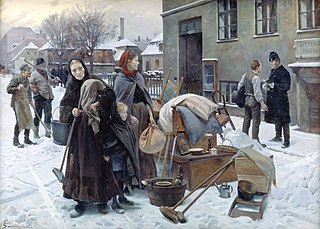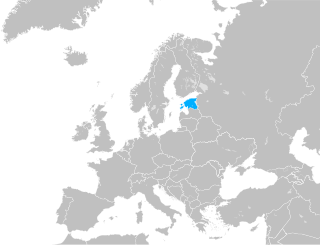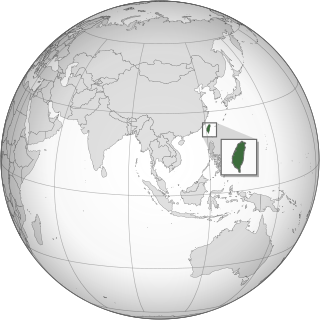
Squatting is the action of occupying an abandoned or unoccupied area of land or a building, usually residential, that the squatter does not own, rent or otherwise have lawful permission to use. The United Nations estimated in 2003 that there were one billion slum residents and squatters globally. Squatting occurs worldwide and tends to occur when people find empty buildings or land to occupy for housing. It has a long history, broken down by country below.

Eviction is the removal of a tenant from rental property by the landlord. In some jurisdictions it may also involve the removal of persons from premises that were foreclosed by a mortgagee.

A tent city is a temporary housing facility made using tents or other temporary structures.

A shanty town, squatter area or squatter settlement is a settlement of improvised buildings known as shanties or shacks, typically made of materials such as mud and wood. A typical shanty town is squatted and in the beginning lacks adequate infrastructure, including proper sanitation, safe water supply, electricity and street drainage. Over time, shanty towns can develop their infrastructure and even change into middle class neighbourhoods. They can be small informal settlements or they can house millions of people.
Equity stripping, also known as equity skimming, is a type of foreclosure rescue scheme. Often considered a form of predatory lending, equity stripping became increasingly widespread in the early 2000s. In an equity stripping scheme an investor buys the property from a homeowner facing foreclosure and agrees to lease the home to the homeowner who may remain in the home as a tenant. Often, these transactions take advantage of uninformed, low-income homeowners; because of the complexity of the transaction, victims are often unaware that they are giving away their property and equity. Several states have taken steps to confront the more unscrupulous practices of equity stripping. Although "foreclosure re-conveyance" schemes can be beneficial and ethically conducted in some circumstances, many times the practice relies on fraud and egregious or unmeetable terms.
City Life/Vida Urbana commonly known as "City Life," is a social justice group in Boston, Massachusetts. Founded in 1973, a group of local residents and activists with roots in the civil rights, feminist and anti-Vietnam War movements founded the Jamaica Plain Tenants Action Group, now City Life/Vida Urbana. Since 2008, City Life has focused on preventing evictions of both former owners and renters resulting from a rise in foreclosures. City Life/Vida Urbana is currently based in Jamaica Plain, with satellite memberships in East Boston, Brockton, Lynn, Quincy, and Worcester.
The Umoja Village shantytown was founded on October 23, 2006, in the Liberty City section of Miami, Florida, in response to gentrification and a lack of low-income housing in Miami. The name Umoja is Swahili for "unity", hence "Unity Village".
The Frances Street Squats were a set of six squatted houses, including one women-only building, that existed between February and November 1990 in Vancouver, Canada. They were occupied by SAVE and took a stand against development which was generally supported by local people. The Vancouver Police Department evicted the buildings.
This article is a subordinate article to the subprime mortgage crisis. It covers some of the miscellaneous effects of the crisis in more detail, to preserve the flow of the main page.

Project No One Leaves (PNOL) is a Boston non-profit tenants' rights organization which provides legal education to people living in foreclosed homes to enable them to understand and protect their legal rights. The group was established in 2008 by members of the Harvard Legal Aid Bureau who specialized in housing law in response to a perceived spike in foreclosures and mass evictions in low-income Boston neighborhoods.

In England and Wales, squatting – taking possession of land or an empty house the squatter does not own – is a criminal or civil offence, depending on circumstances. People squat for a variety of reasons which include needing a home, protest, poverty, and recreation. Many squats are residential; some are also opened as social centres. Land may be occupied by New Age travellers or treesitters.
In the United States, squatting occurs when a person enters land that does not belong to them without lawful permission and proceeds to act in the manner of an owner. Historically, squatting occurred during the settlement of the Midwest when colonial European settlers established land rights and during the California Gold Rush. There was squatting during the Great Depression in Hoovervilles and also during World War II. Shanty towns returned to the US after the Great Recession (2007–2009) and in the 2010s, there were increasing numbers of people occupying foreclosed homes using fraudulent documents. In some cases, a squatter may be able to obtain ownership of property through adverse possession.

Occupy Homes or Occupy Our Homes is part of the Occupy movement which attempts to prevent the foreclosure of people's homes. Protesters delay foreclosures by camping out on the foreclosed property. They also stage protests at the banks responsible for the ongoing foreclosure crisis, sometimes blocking their entrances. It has been compared to the direct action taken by people to prevent home foreclosures during the Great Depression in the United States.
CHARAS/El Bohio Community Center was a neighborhood organization and squatted community center in New York's East Village between 1979 and 2001.

Squatting in Australia usually refers to a person who is not the owner, taking possession of land or an empty house. In 19th century Australian history, a squatter was a settler who occupied a large tract of Aboriginal land in order to graze livestock. At first this was done illegally, later under licence from the Crown.

The Red House eviction defense was an occupation protest at a foreclosed house on North Mississippi Avenue in the Humboldt neighborhood in the Albina district, a historically Black district of Portland, Oregon, United States.

Squatting in Estonia is the occupation of unused land or derelict buildings without the permission of the owner. It is a tactic used by different groups including former factory workers, homeless people, artists and anarchists.

Squatting in Angola occurs when displaced peoples occupy informal settlements in coastal cities such as the capital Luanda. The Government of Angola has been criticized by human rights groups for forcibly evicting squatters and not resettling them.

Squatting in Taiwan is the occupation of unused land or derelict buildings without the permission of the owner. Squatting was fuelled by migrants from China from the 1950s onwards and in addition cities such as the capital Taipei were swelled by internal migrants from the countryside. In order to create Daan Forest Park, 12,000 squatters were evicted. The informal settlement at Treasure Hill has been recognized as cultural heritage.
Moms 4 Housing is a housing activist group in Oakland, California. It was formed and received national attention after three formerly homeless Black women moved their families into a vacant three-bedroom house as squatters without permission from the owner, a real estate redevelopment company. The publicity of their occupation highlighted issues of homelessness, affordable housing, gentrification, and human rights. In January 2020, after resisting a judge's order to leave the residence, "the moms" were forcibly but peaceably arrested and removed by a heavily armed sheriff's department. A few days later, the governor and the mayor brokered a deal with Moms 4 Housing for a local community land trust to purchase what was came to be called the "Moms' House" from the owner. After refurbishing the embattled house, the group began to use it as a transitional home for homeless mothers. The actions of Moms 4 Housing inspired California lawmakers to make changes to housing laws statewide.












